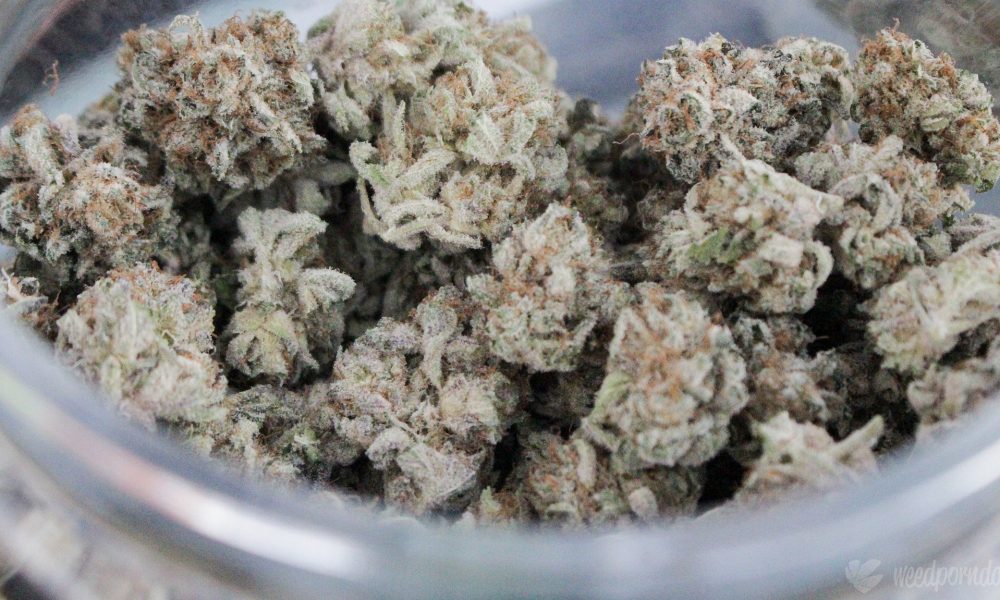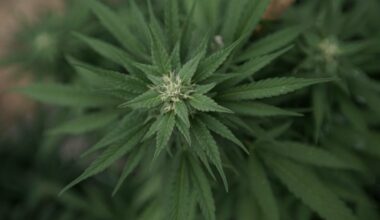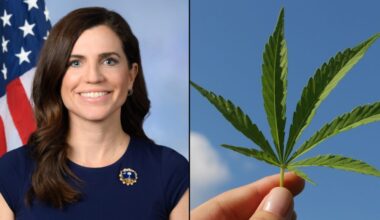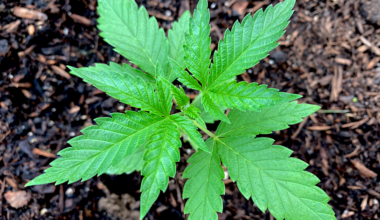New York lawmakers on Saturday sent a budget proposal to the governor’s desk that includes provisions to let marijuana businesses take state tax deductions that are available to other industries despite an ongoing federal ban on cannabis.
Senate and Assembly leaders had included a form of the proposal in earlier versions their respective budget measures last month. Negotiations with Gov. Kathy Hochul (D) over unrelated components caused a delay and budget deadline extension, but the cannabis measure was included in the final version passed by the Assembly and Senate.
The proposals would carve out an exemption, making it so marijuana companies would be allowed to make tax deductions for business expenses and claim credits at the state level that they’re currently barred from utilizing on their federal returns under prohibition.
Medical and adult-use cannabis companies across the U.S. are precluded from making certain federal tax deductions under an Internal Revenue Code section known as 280E. By decoupling state tax code from the federal law in this respect, New York marijuana businesses would see significant tax savings.
Under 280E, businesses whose activities consist of “trafficking in controlled substances (within the meaning of schedule I and II of the Controlled Substances Act)” cannot make deduct most business expenses from their federal taxes or receive tax credits, even though they are still obligated to pay taxes like any other company.
Because many states simply mirror federal tax policy in their own codes, the federal government’s anti-cannabis stance also blocks state-level deductions in some places.
As a result, some cannabis businesses pay effective tax rates of up to 80 percent, according to industry groups and accounting firms.
To help resolve the issue, New York legislative leaders in both chambers agreed to insert language into their budget proposals that amends state statute by adding new sections to a list of exceptions for taxable entire net income and adjusted gross income.
—
Marijuana Moment is already tracking more than 1,000 cannabis, psychedelics and drug policy bills in state legislatures and Congress this year. Patreon supporters pledging at least $25/month get access to our interactive maps, charts and hearing calendar so they don’t miss any developments.![]()
Learn more about our marijuana bill tracker and become a supporter on Patreon to get access.
—
The state would not tax cannabis companies for any amount that the federal government disallows under 280E “related to the production and distribution of adult-use cannabis products.”
Here’s the full text of the new, proposed sections what is exempted from forms of taxable income under state tax code:
“The amount of any federal deduction disallowed pursuant to section 280E of the internal revenue code related to the production and distribution of adult-use cannabis products, as defined by article twenty-C of this chapter, not used as the basis for any other tax deduction, exemption, or credit and not otherwise required to be added back by paragraph (b) of this subdivision in computing entire net income.”
“The amount of any federal deduction disallowed pursuant to section 280E of the internal revenue code related to the production and distribution of adult-use cannabis products, as defined by article twenty-C of this chapter, not used as the basis for any other tax deduction, exemption, or credit and not otherwise required to be added back by subsection (b) of this section in computing New York adjusted gross income.”
The policy, if signed by the governor, would “take effect immediately and apply to taxable years beginning on and after January 1, 2022.”
The budget legislation headed to Hochul’s desk separately contains $200 million in funding—sourced from cannabis business fees and private capital investment—to “assist social and economic equity-entrepreneurs with the build-out of their adult-use cannabis businesses,” according to a press release from the governor’s office.
When it comes to the state 280E tax workaround, language of the earlier budget proposals released last month was different, but the intent and effect are seemingly the same.
Previously, the legislation stated that “the provisions of Section 280E of the Internal Revenue Code, relating to expenditures in connection with the illegal sale of drugs, shall not apply for the purposes of this chapter to the carrying on of any trade or business that is commercial cannabis activity by a licensee.”
Sen. Jeremy Cooney (D) filed a standalone bill in December seeking a similar carve-out for the state’s burgeoning cannabis market. Assemblymember Donna Lupardo (D) followed suit in her chamber.
Other states have considered enacting similar policy changes in light of the ongoing federal tax block for the marijuana industry. Missouri lawmakers, for example, sent a bill to the governor that would have let medical cannabis businesses make tax deductions, but it was vetoed for reasons that weren’t specifically related to marijuana issues.
At the federal level, a board member of the National Credit Union Administration (NCUA) said on Thursday that he was encouraged to see states like New York taking action to normalize the marijuana industry within the financial sector, but he stressed that Congress needs to act, too.
New York Sen. Liz Krueger (D), who sponsored the adult-use legalization law that former Gov. Andrew Cuomo (D) signed into law last year, is also supportive of providing cannabis businesses with the tax relief.
“The goal here is to decouple the state from the federal government on the deduction of business expenses to allow cannabis companies to deduct on their state taxes (since they can’t do so on their federal taxes),” Krueger, who chairs the Senate Finance Committee, told Cannabis Wire last month. “All other businesses can deduct business expenses, and not being able to is a burden on the cannabis industry. We can’t fix the federal issue, but we can fix the state issue, which was the impetus for this language.”
In a report published last year, congressional researchers examined tax policies and restrictions for the marijuana industry—and how those could change if any number of federal reform bills are enacted.
Meanwhile in New York, regulators advanced a rule last month to make it so people with prior marijuana convictions, or whose family members have been harmed by criminalization, will get the first round of adult-use marijuana retailer licenses—ahead of existing medical cannabis businesses. A recent poll found that most New Yorkers voters are against that proposal.
The licensing development is one part of what the Hochul administration is calling the “Seeding Opportunity Initiative,” which she also announced last month.
Office of Cannabis Management (OCM) Executive Director Chris Alexander said that he expects upwards of 200 “justice involved” applicants to receive the priority licenses under the proposal, with retailers potentially coming online by the year’s end.
The state has also taken separate steps to get the industry in a position to have products available by creating provisional marijuana cultivator and processor licenses for existing hemp businesses that take certain steps to promote equity in the emerging industry. Hochul signed that legislation in February. This “Farmers First Program” is another one of the three branches of the administration’s Seeding Opportunity Initiative.
Assembly Majority Leader Crystal Peoples-Stokes (D), who sponsored the legislation that created the legalization law and recently launched an equity-focused political action committee that will place a strong focus on electing candidates that support marijuana reform, said that “we are doing what no other state has done by focusing on the people most criminalized by cannabis prohibition, and promoting New York farmers.”
As it stands, adults 21 and older can possess and publicly consume cannabis, as well as gift marijuana to other adults as long as they aren’t being compensated. But regulators are still finalizing licensing rules, and there are currently no retailers that are authorized to sell cannabis for adult use in the state.
Hochul has repeatedly emphasized her interest in efficiently implementing the legalization law.
The governor released a State of the State book in January that called for the creation of a $200 million public-private fund to specifically help promote social equity in the state’s burgeoning marijuana market. That funding, called the “New York Social Equity Cannabis Investment Program,” is the last component of the Seeding Opportunity Initiative.
Hochul said that while cannabis business licenses have yet to be approved since legalization was signed into law last year, the market stands to generate billions of dollars, and it’s important to “create opportunities for all New Yorkers, particularly those from historically marginalized communities.”
That proposal was also cited in the governor’s executive budget, which was released in January. The budget also estimated that New York stands to generate more than $1.25 billion in marijuana tax revenue over the next six years.
Enacting legislation that expedites licensing could help the state reduce the number of businesses that are effectively using the legal “gifting” provision of the state’s marijuana law to give away cannabis for “free” if a non-marijuana-related purchase is made.
New York regulators recently issued warnings to more than two dozen businesses that they allege are either illegally selling marijuana without a license or exploiting the “gifting” component.
Here are some other ways that New York lawmakers and regulators are working to build upon the legalization law as the state prepares to implement retail sales:
In February, for example, a state senator filed a bill that would promote recycling in the marijuana industry once retail sales officially launch.
Sen. Michelle Hinchey (D) is also sponsoring that legislation, which would require cannabis shops to apply a $1 deposit for any marijuana products sold in single-use plastic containers and also reimburse consumers for that fee if they return the container.
The senator is also behind a separate bill filed last year that would prioritize hemp-based packaging over synthetic plastics for marijuana products.
The recycling bill is identical to an Assembly version filed by Assemblywoman Patricia Fahy (D) last year.
The state Department of Labor separately announced in recent guidance that New York employers are no longer allowed to drug test most workers for marijuana.
Meanwhile, a New York lawmaker introduced a bill in June that would require the state to establish an institute to research the therapeutic potential of psychedelics.
Another state legislator filed legislation in December to legalize psilocybin mushrooms for medical purposes and establish facilities where the psychedelic could be grown and administered to patients.
Meanwhile, as New York prepares the launch of its adult-use marijuana market, OCM announced a significant expansion of the existing medical cannabis program.
Now doctors will be able to issue medical marijuana recommendations to people for any condition that they feel could be treated by cannabis, rather than rely on a list of specific eligible maladies.
Photo courtesy of WeedPornDaily.
Medical Disclaimer:
The information provided in these blog posts is intended for general informational and educational purposes only. It is not a substitute for professional medical advice, diagnosis, or treatment. Always seek the advice of your physician or other qualified healthcare provider with any questions you may have regarding a medical condition. The use of any information provided in these blog posts is solely at your own risk. The authors and the website do not recommend or endorse any specific products, treatments, or procedures mentioned. Reliance on any information in these blog posts is solely at your own discretion.







